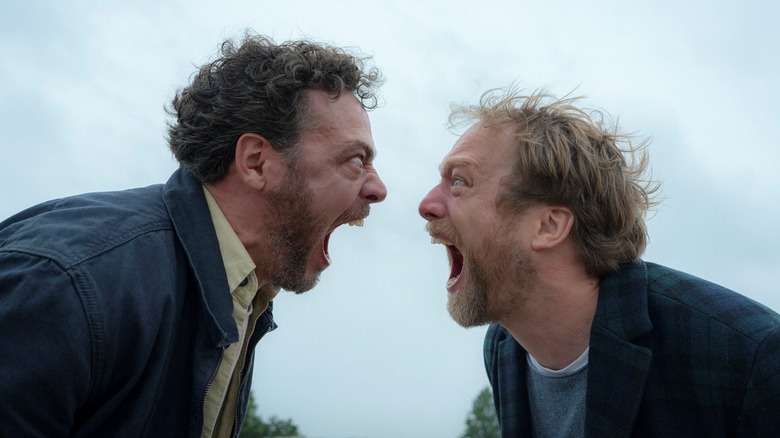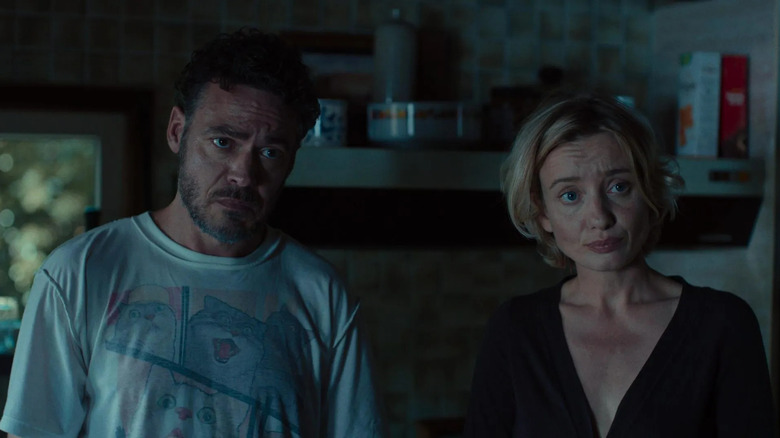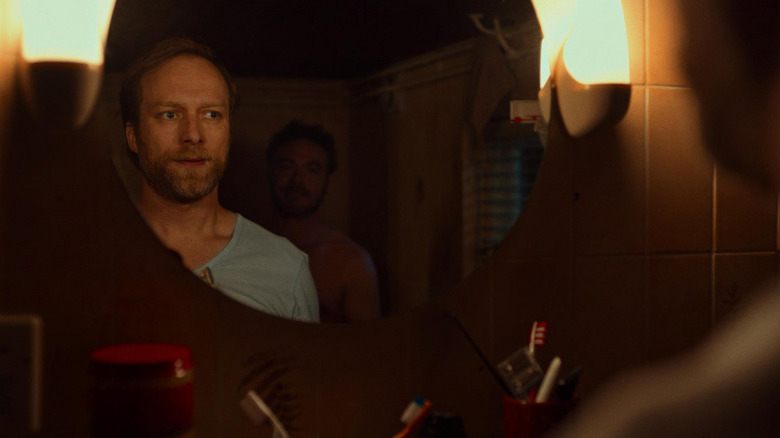Christian Tafdrup Knew Speak No Evil Would Draw Comparisons To Funny Games
It takes a lot to rattle my bones these days, but Christian Tafdrup's Danish psychological horror film "Speak No Evil" will stay with me for a long, long time. The film centers on a Danish family who befriend a Dutch family while on vacation, only to be invited months later to their home for a bit of a friendly reunion. The setup is conventional, almost unassuming — after all, it's a similar setup to the John Cena comedy "Vacation Friends." But "Speak No Evil" isn't a rousing buddy comedy, it's a devastating horror film. As can be predicted, the Dutch family's intentions are not at all what the Danish family expected, and they are suddenly thrust into a nightmarish weekend holiday and a fight for their lives.
As Bjørn (Morten Burian), Louise (Sidsel Siem Koch), and their daughter Agnes (Liva Forsberg) begin to suspect Patrick (Fedja van Huêt), Karin (Karina Smulders), and their mute son Abel (Marius Damslev) aren't who they appear to be, the family still feels compelled to be gracious guests. It's easy to scream "OH MY GOD, JUST LEAVE!" at a TV screen from the safety of your couch, but can any of us really predict how we'd respond in the moment? Would we trust our instincts and leave, knowing full well that we'd be "rude," or would we bite our tongues to the point of drawing blood in an attempt to appear respectful? Tafdrup wanted to play with these conventions of human interaction, drawing inspiration from another film that sees a family targeted by a pair of unconventional maniacs — Michael Haneke's "Funny Games."
Horror shown in a realistic way
"Speak No Evil" is a bleak, harrowing film once the reality of the situation comes to the surface, but it's also operating with an unsettling streak of dark comedy, even as the stakes escalate beyond comprehension. In a recent interview with RogerEbert.com, director and co-writer Christian Tafdrup explains that this humor was a conscious decision. "We talked about 'Funny Games,' by Michael Haneke, who also uses horror in a realistic way," he says. One of the major differences between the two films is that in "Funny Games," the duo is violent almost immediately, whereas the danger of "Speak No Evil" slowly creeps into the fold. "We had a couple who could leave every minute but did not, and why don't they? In situations where somebody is testing you or crossing boundaries, how do you react?"
Tafdrup said that an earlier draft of the script had Patrick and Karin acting threatening from the beginning, but felt showing their hand too soon would have made Bjørn and Louise look "stupid" for not immediately running away. "In every situation we wrote, we believed there should be two possibilities all the time: the possibility that they were actually being intimidated, and the possibility it's a misunderstanding and their own fault." As someone who is constantly second-guessing my instincts and overanalyzing every social interaction, being trapped in an exchange like "Speak No Evil" would be my absolute kryptonite, and that's even before realizing the severity of the situation. "It's like, 'I'm a guest at their house. Why should they be rude?' That's typical of me to think," said Tafdrup. "We wanted to create that feeling in audiences."
Suspense underneath the comedy
Christian Tafdrup continued speaking about the comedy of "Speak No Evil," and the importance of making sure the jokes were always rooted in something more sinister, rather than simply joking for the sake of levity. This isn't a hearty "ha ha" style of humor, but the kind of laughter that explodes from behind a grinded smile and a racing heartbeat. "You have a sense, underneath these comedic situations, that there's suspense and darkness, which suggests everything is not what it seems," he told RogerEbert.com. "You could easily write a scene about some guy offering a girl some meat, but the girl is a vegetarian, to be funny, but underneath, you can still establish an atmosphere of horror."
This specific mention of feeding meat to a vegetarian in a horrific manner is reminiscent of Anthony DiBlasi's 2009 film "Dread." I won't spoil anything for you, but if this sort of uncomfortable horror piques your interest, consider adding the film to your watchlist. It's not quite "Speak No Evil" levels of devastating, but it's set in that same world of "realistic horror" as the former and "Funny Games."
"We built up that suspense, leading into darker scenes where [Bjørn and Louise] are being increasingly tested but never say no, until a point that might be fatal," Tafdrup continued. "It was a balance between keeping it subtle but creating the sensation of characters going to a bad place without knowing where, why, and when."
"Speak No Evil" is currently available to stream on Shudder.


